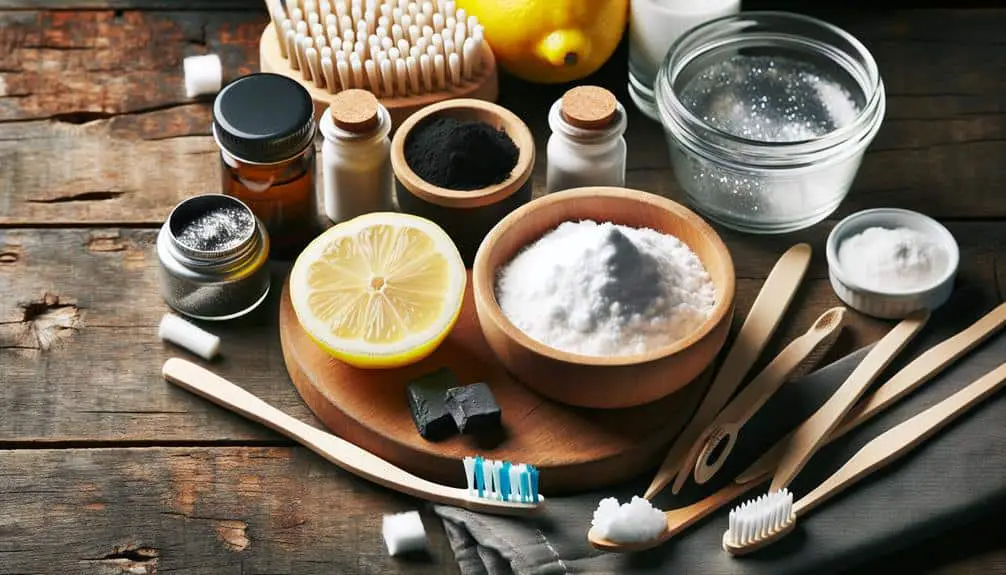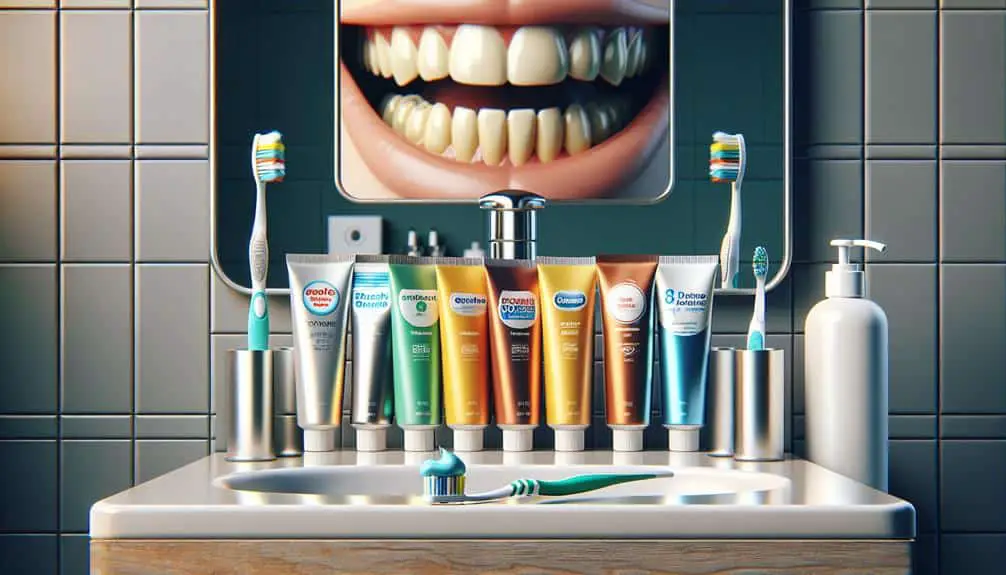DIY whitening treatments for yellow teeth are popular because they are affordable, convenient, and offer immediate results, making them a preferred choice for achieving a brighter smile. These at-home solutions like baking soda, hydrogen peroxide, and activated charcoal present practical options for those on a budget who seek to whiten their teeth effectively. The accessibility and ease of integration into daily routines add to their appeal. If you desire to understand more about the rising trend and nuances of home teeth whitening solutions, further insights await.
Key Points
- Cost-effective and practical solutions for yellow teeth on a budget.
- Convenience of integrating whitening treatments into daily routines.
- Natural ingredients offer an effective and safe approach to teeth whitening.
- Immediate results with DIY treatments, providing instant gratification.
- Rising trend driven by the accessibility, affordability, and claimed effectiveness of at-home whitening kits.
Cost-Effective Solutions for Yellow Teeth
When looking to address yellow teeth on a budget, incorporating DIY whitening treatments can be a practical and effective solution. Affordable options for whitening teeth at home include using baking soda, hydrogen peroxide, and activated charcoal. These ingredients are known for their teeth-whitening properties and can be easily found in most households or purchased inexpensively from stores.
Baking soda, also known as sodium bicarbonate, is a mild abrasive that can help scrub away surface stains on teeth. Mixing a small amount with water to form a paste and brushing gently can aid in removing discoloration.
Hydrogen peroxide, a common antiseptic, can also act as a bleaching agent when used in safe concentrations. Rinsing with a diluted solution or using it as a mouthwash can assist in brightening teeth over time.
Activated charcoal has gained popularity as a natural whitening remedy. It works by adsorbing compounds that cause stains on the teeth. Creating a paste with water and brushing for a few minutes can help lift surface stains, revealing a brighter smile. Incorporating these affordable at-home remedies into your oral care routine can contribute to combating yellow teeth without breaking the bank.
Convenience of DIY Whitening Treatments
To enhance the discussion further, let's now explore the convenience of incorporating DIY whitening treatments for yellow teeth. DIY whitening treatments offer a time-saving solution for individuals looking to brighten their smiles without the hassle of scheduling appointments at a dental office. By opting for at-home convenience, you can easily integrate whitening treatments into your daily routine without disrupting your schedule.
One of the key advantages of DIY whitening treatments is the flexibility they provide. You have the freedom to whiten your teeth at a time that suits you best, whether it's early in the morning, during your lunch break, or in the evening before bed. This flexibility allows you to achieve a whiter smile without having to allocate specific time slots for dental visits.
Moreover, the accessibility of DIY whitening products makes them a popular choice among individuals seeking convenience. With a wide range of whitening options available over the counter or online, you can select the treatment that aligns with your preferences and budget, further enhancing the convenience of at-home whitening solutions.
Natural Ingredients in DIY Whiteners
Incorporating natural ingredients in DIY whiteners can offer a vital yet effective approach to brightening your smile. Herbal remedies like baking soda, activated charcoal, and coconut oil are popular choices in DIY toothpaste recipes for teeth whitening. These ingredients are believed to have natural whitening properties that can help remove surface stains on teeth. However, it's essential to note that while these natural remedies can be effective to some extent, they may not provide the same level of whitening as professional treatments.
When considering DIY toothpaste for teeth whitening, safety should be a top priority. Some natural ingredients, like lemon juice and apple cider vinegar, are acidic and can erode tooth enamel if used excessively. It's crucial to use these ingredients in moderation and be aware of their potential effects on oral health. Before trying any DIY whitening treatment, it's advisable to consult with a dental professional to ensure that it's safe and suitable for your teeth.
Instant Gratification With DIY Treatments
For those seeking immediate results, DIY treatments can provide a quick boost to your teeth's appearance. When looking for quick results through at-home solutions, there are a few key points to take into account:
- Convenience: DIY whitening treatments offer the convenience of being able to address teeth discoloration from the comfort of your home, saving you time and a trip to the dentist.
- Cost-Effective: These treatments are usually more affordable than professional whitening procedures, making them an appealing option for those on a budget.
- Accessibility: With DIY treatments widely available in stores or online, you can easily access these products whenever you feel the need to brighten your smile.
- Immediate Impact: Many DIY whitening products claim to show immediate results after just one use, providing a quick fix for yellowing teeth.
Rising Trend of Home Teeth Whitening
The growing popularity of home teeth whitening solutions is evident in the increasing number of individuals opting to enhance their smiles without professional intervention. This trend is driven by several factors, including convenience, cost-effectiveness, and the desire for quick results.
Many at-home teeth whitening kits claim to offer professional results, promising to brighten teeth several shades lighter. However, it's crucial to take into account the long-term effects of these treatments.
While home teeth whitening can provide immediate results, the outcomes may vary depending on the product used and the individual's dental health. Some over-the-counter whitening products may contain abrasive ingredients that can harm tooth enamel if not used correctly. Moreover, the effects of home whitening treatments may not be as long-lasting as those achieved through professional dental procedures.
Professional teeth whitening conducted by a dentist guarantees both immediate results and long-term effects, as dentists use higher quality products and tailor the treatment to each patient's specific needs. Hence, while home teeth whitening can be a convenient and cost-effective option, it's crucial to evaluate the potential risks and benefits for achieving a brighter, healthier smile.
Frequently Asked Questions
Are DIY Whitening Treatments Safe for Individuals With Sensitive Teeth or Existing Dental Issues?
For individuals with sensitive teeth or existing dental issues, DIY whitening treatments may not be safe. Sensitivity management and dental health should be prioritized. Professional consultation and exploring alternative methods are recommended for effective and safe whitening.
What Are the Potential Risks or Side Effects of Using DIY Whitening Treatments at Home?
When using DIY whitening treatments at home, be cautious of potential risks and side effects like gum irritation or tooth sensitivity. Consider consulting a dentist for safer and more effective alternatives.
Can DIY Whitening Treatments Cause Damage to Tooth Enamel or Gums if Used Incorrectly?
Improper use of DIY whitening treatments can pose potential risks. Enamel damage may occur when applied incorrectly. It's essential to follow instructions meticulously to safeguard your teeth and gums. Consult a professional for guidance.
How Often Should DIY Whitening Treatments Be Used to Maintain Results Without Causing Harm?
To maintain results and prevent harm, make sure you space out DIY whitening treatments. Stick to using them every 1-2 months and follow precautions diligently. Consistent care will keep your smile bright without risking damage.
Are There Any Long-Term Effects or Consequences of Using DIY Whitening Treatments for Yellow Teeth?
Long-term effectiveness of DIY whitening treatments for yellow teeth may vary. Risks include increased sensitivity if not used correctly. Proper usage and monitoring can help minimize negative consequences, ensuring a brighter smile with fewer side effects.
Conclusion
To sum up, DIY whitening treatments for yellow teeth have become popular due to their cost-effectiveness, convenience, use of natural ingredients, and instant results.
Like a ray of sunshine breaking through the clouds, these at-home remedies offer a bright and affordable solution to achieving a whiter smile.
Embracing this rising trend of home teeth whitening can help you achieve a brighter and more confident smile without breaking the bank.



